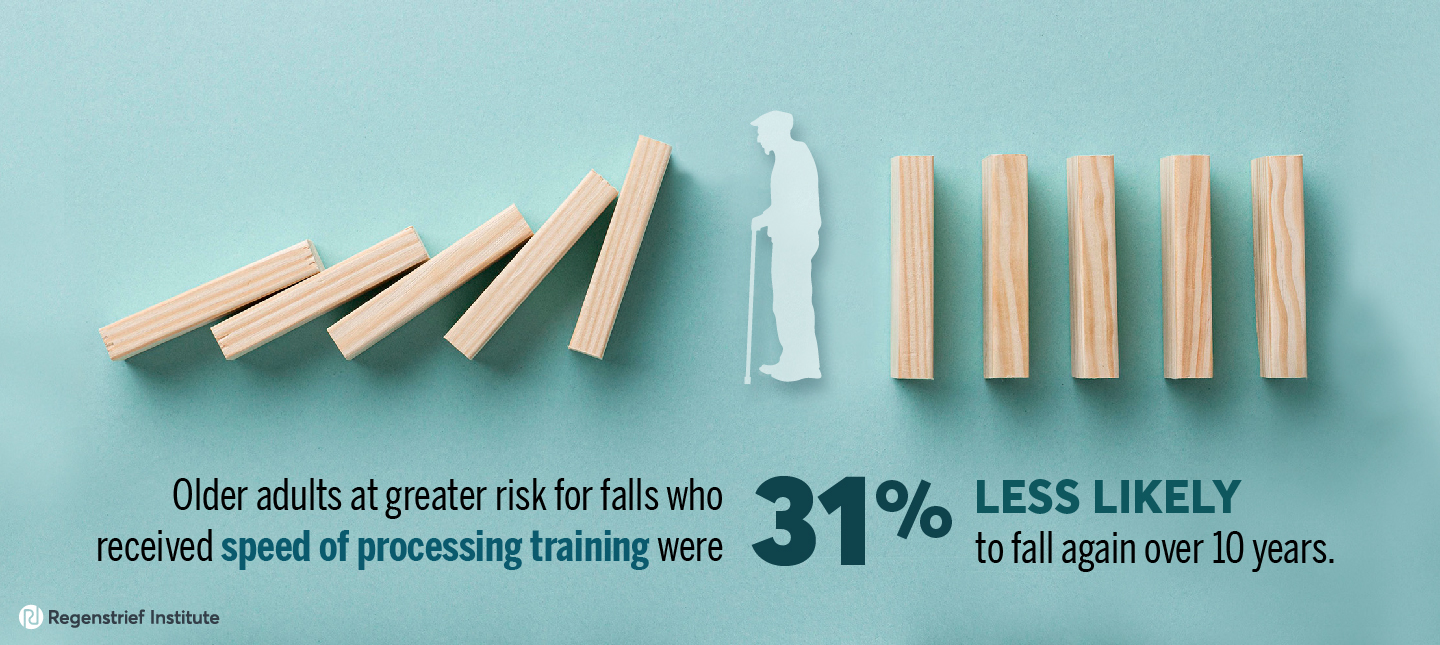Falls are leading cause of death from injury for older adults in the U.S.
One out of four adults, age 65 or older, falls every year in the U.S. Falls cause approximately 36,000 deaths annually in this age group, making it the leading cause of death from injury for older adults in the U.S.
A new study, led by Regenstrief Institute Research Scientist Briana Sprague, PhD, examines whether cognitive training — specifically, speed of processing, memory and reasoning training — can lower the risk of falling. Significantly, the researchers found no effects of the training on likelihood of falling for those at low risk of falling. Dr. Sprague also is a faculty member at Indiana University School of Medicine.
However, older adults at greater risk for future falls — typically, due to a previous fall — who received speed of processing training were 31 percent less likely to experience a subsequent fall over 10 years compared to individuals at high risk for falls who did not receive this mental training. Speed of processing training involves correctly identifying increasingly complex visual information to help individuals respond more quickly to stimuli and disregard those that are unimportant.
“There has been a growing interest in the relationship between cognitive function and mobility. Our study, which used comprehensive data from 2,802 older adults, who were mentally high functioning at the onset of the 10-year period during which they were followed, did not find that cognitive training prevented falls, except for individuals at high risk for falls who received one specific type of brain coaching – speed of processing training,” said Dr. Sprague. “As we have shown, not everybody benefits in the same way from cognitive training. However, our findings support the belief that for some individuals, physical-based interventions to reduce falls may be further enhanced by cognitive training.”
Every year approximately 3 million older adults are treated in emergency departments for fall injuries in the U.S. More than 800,000 older adults are hospitalized annually for a head injury or hip fracture following a fall, often beginning a downward spiral in mobility and overall health.
According to the Centers for Disease Control and Prevention (CDC), medical costs for falls by adults age 65 and older totaled $50 billion in 2015, of which 75 percent was shouldered by Medicare and Medicaid.
“In this work, which we believe to be the first study to examine the effect of cognitive training on the risk of falls across the following 10 years, we did not find an association between fall occurrence and demographic factors or cognitive status,” said Dr. Sprague. “This may be because study participants, who were age 65 to 94 when data collection began, were high functioning cognitively at baseline.”
In future work Dr. Sprague and colleagues plan to investigate how multi-component lifestyle interventions such as nutrition and exercise are related to physical and brain health.
“Does Cognitive Training Reduce Falls across Ten Years?: Data from the ACTIVE Trial” is published in the International Journal of Environmental Research and Public Health.
The ACTIVE Cognitive Training Trial was supported by grants from the National Institutes of Health to six field sites and the coordinating center, including Hebrew Senior-Life, Boston (NR04507), the Indiana University School of Medicine (NR04508), the Johns Hopkins University (AG014260), the New England Research Institutes (AG014282), the Pennsylvania State University (AG14263), the University of Alabama at Birmingham (AG14289), and the University of Florida (AG014276). Briana Sprague also received additional support for this research from the Indiana University Health-Indiana University School of Medicine Strategic Research Initiative.
Authors and affiliations
Briana N. Sprague1,2, Lesley A. Ross3 and Karlene K. Ball4
1Division of General Internal Medicine and Geriatrics, Indiana University School of Medicine, Indianapolis, IN 46202, USA
2Center for Aging Research, Regenstrief Institute, Indianapolis, IN 46202, USA
3Department of Psychology, Clemson University, Clemson, SC 29634, USA
4Department of Psychology, University of Alabama at Birmingham, Birmingham, AL 35233, USA.
About Briana Sprague, PhD
In addition to her role as a research scientist at Regenstrief Institute, Briana Sprague, PhD, is an assistant professor of medicine at Indiana University School of Medicine.
About Regenstrief Institute
Founded in 1969 in Indianapolis, the Regenstrief Institute is a local, national and global leader dedicated to a world where better information empowers people to end disease and realize true health. A key research partner to Indiana University, Regenstrief and its research scientists are responsible for a growing number of major healthcare innovations and studies. Examples range from the development of global health information technology standards that enable the use and interoperability of electronic health records to improving patient-physician communications, to creating models of care that inform practice and improve the lives of patients around the globe.
Sam Regenstrief, a nationally successful entrepreneur from Connersville, Indiana, founded the institute with the goal of making healthcare more efficient and accessible for everyone. His vision continues to guide the institute’s research mission.
About IU School of Medicine
IU School of Medicine is the largest medical school in the U.S. and is annually ranked among the top medical schools in the nation by U.S. News & World Report. The school offers high-quality medical education, access to leading medical research and rich campus life in nine Indiana cities, including rural and urban locations consistently recognized for livability.








